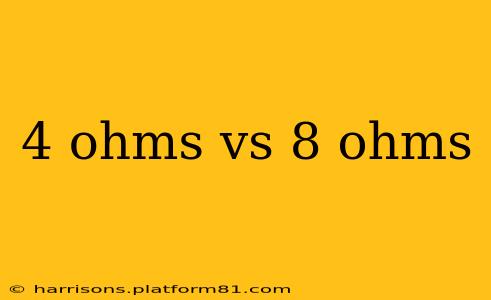4 Ohms vs. 8 Ohms: Understanding Impedance in Audio
Choosing between 4-ohm and 8-ohm speakers is a crucial decision for audiophiles and home theater enthusiasts. Understanding the difference between these impedance ratings is key to ensuring optimal sound quality and preventing damage to your audio equipment. This guide will delve into the specifics, answering common questions and clarifying the implications of each impedance level.
What is Impedance?
Before we compare 4 ohms and 8 ohms, let's define impedance. Impedance, measured in ohms (Ω), is the opposition to the flow of current in an electrical circuit. In audio, it specifically refers to the resistance a speaker presents to the amplifier's output. Lower impedance (like 4 ohms) means less resistance, while higher impedance (like 8 ohms) means more resistance.
What is the difference between 4-ohm and 8-ohm speakers?
The core difference lies in how much power the speaker draws from the amplifier. A 4-ohm speaker will draw more power from the amplifier than an 8-ohm speaker at the same volume. This means a 4-ohm speaker can potentially sound louder and have more bass response, but it also puts more stress on the amplifier.
Which impedance is better, 4 ohms or 8 ohms?
There's no universally "better" impedance. The ideal choice depends on your amplifier and your desired sound.
-
8-ohm speakers: These are generally considered safer for amplifiers, as they place less demand on the amplifier's power output. They are more forgiving if your amplifier isn't perfectly matched to the speakers. This makes them a popular choice for beginners and those prioritizing longevity of their equipment.
-
4-ohm speakers: These can deliver a more powerful and potentially richer sound, particularly with bass-heavy genres. However, they require an amplifier that can handle the increased power demand. Using 4-ohm speakers with an amplifier not designed for them can lead to overheating, distortion, or even damage to the amplifier.
Can I use 4-ohm speakers with an 8-ohm amplifier?
This is a crucial question, and the answer is often "it depends." Many modern amplifiers can handle 4-ohm loads, but you must check your amplifier's specifications. Using 4-ohm speakers with an amplifier only rated for 8 ohms can overload the amplifier, potentially leading to damage. Always consult your amplifier's manual to confirm its impedance compatibility.
Can I use 8-ohm speakers with a 4-ohm amplifier?
While less risky than the reverse scenario, using 8-ohm speakers with a 4-ohm rated amplifier will likely result in lower output power. The amplifier will not be working at its optimal capacity. The sound may be quieter and lack the dynamic range it's capable of.
How does impedance affect sound quality?
Lower impedance speakers often provide a more powerful and dynamic sound, with greater bass response. However, this comes at the cost of increased demand on the amplifier. Higher impedance speakers are generally less demanding but may produce a slightly less powerful sound. The overall sound quality also depends on other factors like speaker design, materials, and crossover networks.
What are the risks of mismatching impedance?
Mismatching impedance can lead to several problems:
- Overheating and damage to the amplifier: This is the most significant risk, particularly when using lower-impedance speakers with an amplifier not designed for them.
- Reduced sound quality: Distortion, a lack of power, or a compromised frequency response can result from impedance mismatches.
- Shorter lifespan of equipment: Consistent overloading can reduce the lifespan of both the amplifier and the speakers.
By carefully considering your amplifier's capabilities and your desired sound, you can select the appropriate impedance for your speakers and enjoy optimal audio performance without jeopardizing your equipment. Remember always to consult your amplifier's manual for specific impedance recommendations.
